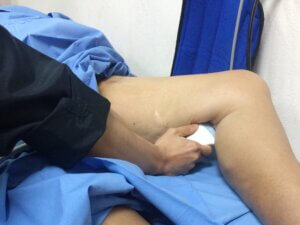Deep Vein Thrombosis
Upper & Lower Limbs DVT Screening

- DVT Diagnosis
- Assess clots in the deep veins of your legs
- Detect blood flow

Deep Vein Thrombosis is a very dangerous condition. Any suspected case of DVT should be investigated and diagnosed as early as possible to prevent serious health complications.
Bodyvie’s specialist vascular sonographer can assess the veins and venous blood flow, ensuring everything is normal and ruling out potential blockages or blood clots.
DVT is most commonly located in blood clots on the legs; it can also be present in the arms or abdomen.
All our scans are administered in a designated ultrasound room, designed with patient comfort in mind. There is a curtained changing area for patient dignity and discretion.
For the scan itself, your sonographer will request that you lie down in a comfortable position on the treatment couch. Ultrasound gel is applied to the area that needs scanning, and your sonographer will talk you through their findings as they scan. Patients can see the scan imaging on a large wall-mounted screen.
If a DVT is positively confirmed, you will be advised to see a doctor or attend A&E.
Deep vein thrombosis (DVT) is a condition that occurs when a blood clot forms in one or more of the deep veins in your body. This usually occurs in your legs and can cause leg pain or swelling. However, sometimes there are no noticeable symptoms.
DVT is a serious condition, as these blood clots can loosen and lodge in the lungs. A scan will identify the clot and allow you to start treatment as early as possible.
Yes. Ultrasounds successfully identify approximately 95% of DVT cases in the large veins above and below the knee.
Your Bodyvie specialist vascular sonographer will assess your veins and venous blood flow, ensuring everything is as it should be and ruling out any potential blockages or blood clots. You will be advised to see a doctor or attend A&E if a blood clot is detected.
The leading cause of deep vein thrombosis (DVT) is damage to a vein from surgery, inflammation, cancer, or damage due to infection or injury.
Your risk of DVT increases with pregnancy, and age, sitting for long periods, bed rest, obesity, smoking, and inherited blood disorders.

Ⓒ Bodyvie Limited 1999 - 2024 All rights reserved. All trademarks acknowledged.
Company number 3849113